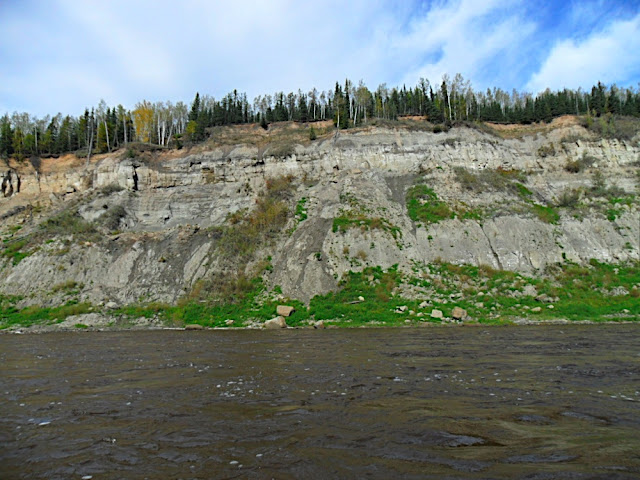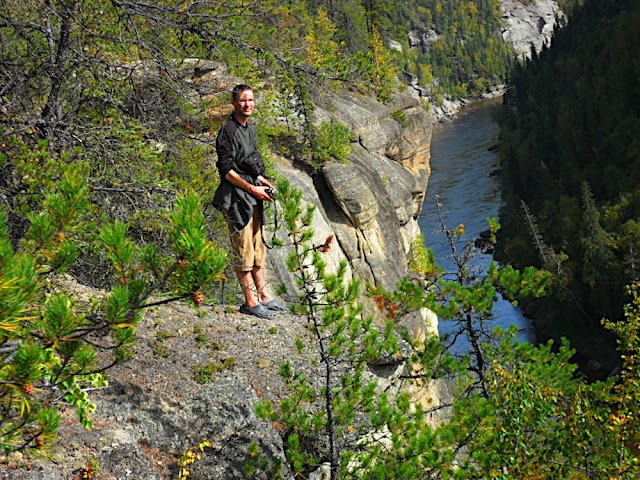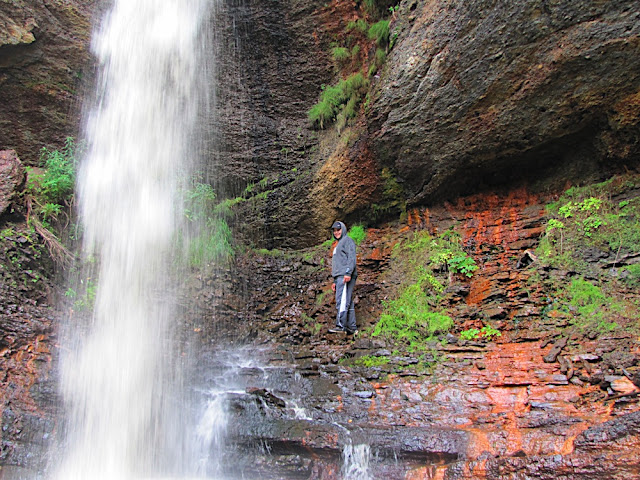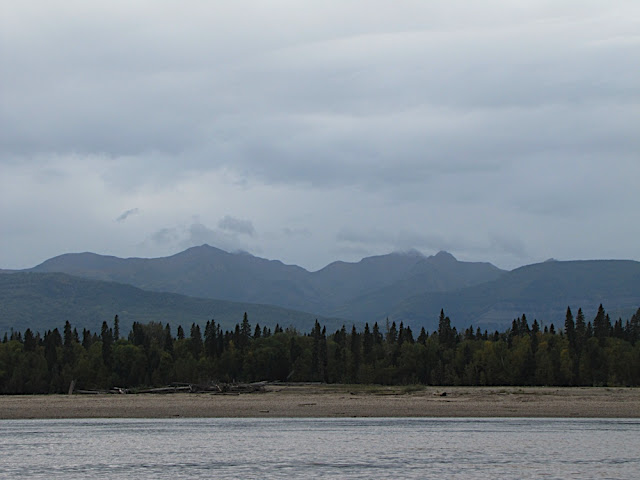The Fort Liard area is known as "The Tropics of the Territories". Its proximity to the mountains creates a unique micro-climate that gets just enough moisture, plenty of warm air, and lots and lots and lots of sunshine to fuel the growth of a lush, healthy forest where gigantic trees grow.
The Petitot River and Liard Rivers flow through the heart of this vibrant ecosystem. I loved tracking and paddling my canoe along these rivers when I lived there.
Recently, I was invited to paddle with someone who wanted to explore these great rivers. Having long wanted to get back, I jumped at the excuse. I contacted a Fort Liard friend, Arthur, about the trip to see if he'd like to be my paddling partner. I knew that he would. Arthur and I had been talking about paddling the Petitot and Liard together for years.
The Petitot was unusually high for the season. Early autumn usually means low water, easy bouldery rapids and giant sandbars stretching along the shoreline. Unusually high rainfalls in the Petitot's giant watershed had raised the water to springtime-like levels. Gone were the easy bouldery rapids and giant sandbars stretching along the shoreline. In their place were fast waters and fun, playful, standing waves.







About halfway from the BC/NWT border to where the Petitot spills into the Liard, there is a five-kilometer stretch of canyon. As much as I love the sandy shorelines and towering cutbanks of the river above the canyon, it is always the canyon that is the highlight of the trip.
Pictures of the canyon, however, never do it justice. They always make it seem much smaller than it really is.




 The unusually heavy rainfalls prior to our trip resulted in unusually heavy erosion activity.
The unusually heavy rainfalls prior to our trip resulted in unusually heavy erosion activity.




Near the end of the canyon is a great little lookout. People have been stopping here for... well... it could be centuries or it could be millennia. People have been inhabiting the Fort Liard area for over 9,000 years.

We took a break from our paddling to hike up to the lookout and take in the view.






Erosion has done strange things to the conglomerate rock at the end of the canyon, not the least of which is a fantastic cave. The cave is large enough to be exciting but small enough that it can be explored without a light. You enter the cave by climbing down into a pit. From the pit, the cave has a long passage that leads into a chamber with a skylight roof. You wouldn't want to fall into the cave through the skylight roof but, if you did, centuries worth of plant debris would help to cushion your fall. Every time I stand in the chamber - which is large enough to accommodate nearly a dozen people (or a half-dozen people comfortably) I wonder how it has been used over time. Leaving the cave is simply a matter of following another passage that opens out of a cliff wall. By turning around and stepping carefully down, one can exit the cave.
 A mushroom forest in the pit that leads to the entrance of the cave.
A mushroom forest in the pit that leads to the entrance of the cave.





After our break we were back on the river. Our destination for the night was Fort Liard and beyond.


 Waterfalls.
Waterfalls.

It's always a strange experience, paddling into Fort Liard. On the Petitot you feel like you're in the middle of nowhere. It's just you, your paddling companions, and nobody else. Then, all of a sudden, there's this little village high up on the banks. You can see a few houses over the bank, but mostly it's the sounds of kids playing and the buzz of chainsaws working in the distance. It's all sounds. From the river, it feels like you're hearing a moment in time that isn't quite your own. You can try to imagine the people up there living their lives, but you can't see them so you can't really know. They're somewhere up there, over the bank. They're unreachable and, as much as you may want them to acknowledge your existence, they don't even know you're down there. They can't see you. From the river you can sense their presence but you can't be a part of them.
For all the years I lived in Fort Liard, it always felt different - strange but wonderful - from the river.

I stayed with the canoes, enjoying the warmth of the late afternoon sun, while my paddling partners ran a few errands in town.


That night, we slept on the banks of the Liard River. We pitched our tents and made supper within sight of the community, but the only things we could hear from our camp were the occasional cracks of bear bangers and gunshots that were used to deter the bison that keep roaming into town and the bear that was haunting the barge landing.
After another deep and restful sleep (the first being on the banks of the Petitot), we began a long and full day of paddling on the Liard. The Liard is a huge river with a watershed that drains from huge portions of the Yukon, BC, and even a portion of Alberta before doubling the volume of the mighty Mackenzie River.
On a windless morning, the river looks deceptively calm - but it is a powerful river, streaming along at about 10km/h or more, depending on the water level.






 Just a portion of a gigantic log jam along the Liard River. A small testament to the size and power of this mighty river.
Just a portion of a gigantic log jam along the Liard River. A small testament to the size and power of this mighty river.Around lunchtime there was somewhere that I wanted to stop. I had been to this place many, many times over land - but never had I been there from the river.
Luckily, I was able to find the place I was looking for. We ate our lunch and then made our way inland. Again, the bounty of the land was awe-inspiring. We were dwarfed by towering poplars that made the poplars around Whitehorse look like second-rate toothpicks. There was life everywhere, growing on everything.
 Hand-sized mushrooms.
Hand-sized mushrooms.
 Skittle-sized 'shrooms. What the heck are these fun-looking little mushrooms called?
Skittle-sized 'shrooms. What the heck are these fun-looking little mushrooms called? Balancing on a small, fallen poplar. Did you know, the first, second, and third tallest measured poplars in the world are located just outside Fort Liard? (The first tallest is now dead, making the second-tallest the first-tallest, etc.)
Balancing on a small, fallen poplar. Did you know, the first, second, and third tallest measured poplars in the world are located just outside Fort Liard? (The first tallest is now dead, making the second-tallest the first-tallest, etc.)The place that I wanted to find was a hidden set of waterfalls that, as best as I can tell, has no name whatsoever. The closest thing I have heard to a name for the falls is "No Name Falls". Makes sense in an ironic sort of way, I guess.
 First, a little creek cuts through the rock...
First, a little creek cuts through the rock... ...before hanging a left and tumbling down a few steps...
...before hanging a left and tumbling down a few steps...
 ...into a nice round pool where it circulates before...
...into a nice round pool where it circulates before... ...disappearing?
...disappearing?
 Ah! There it goes!
Ah! There it goes! Tumbling down over the edge.
Tumbling down over the edge. It hurts a LOT if you stand directly under the falling water.
It hurts a LOT if you stand directly under the falling water.Alas, we still had a lot of river to cover before making camp. An incoming weather system meant that we couldn't dawdle at the falls for much longer. We located and followed an old trail that I knew down to the river bank. I was astounded how much the trail could grow in and how much the river bank could erode in just five short years. How much longer before the trail becomes completely unidentifiable?




We chose another sand/clay bar just as the rain was setting in. In truth, we should have spent more time trying to locate a less-exposed site, but the rain started coming down and it was getting dark.
We pitched our tents before the sand/clay bar got too muddy, rigged a shelter for cooking, ate in the dark, and crawled into bed. We were all exhausted after a very full day of paddling.
It rained straight through the night.
When I woke, I knew we wouldn't be in any great hurry to go anywhere. The wind was pushing on the tent and the rain was still coming down. Wanting to see the state of our world, I donned my rain gear and ventured out.
 A lovely day, don'tchya think?
A lovely day, don'tchya think?We had chosen the very best spot on the sand/mud bar to pitch our tents. We had somewhat decent drainage. Everywhere else along the shore had become a mass of muddy puddles. Our kitchen shelter was now situated in a large pool of water. To make matters worse, the wind was much more than just a gentle breeze. Trees, those massive poplars, were breaking and crashing down in the woods around us. A strong gust and a shift in the wind pulled the tarp off our submerged kitchen area. It was just as well, I figured, it wasn't doing us much good there anymore anyway.
I spent an hour-or-so rigging a new kitchen shelter area, this time closer to the tents. Always the wind threatened to undo my handiwork but finally I had it bomb-proof.

I went to go and check our canoe. We had left it upright over the night and, much to my surprise, it was half-filled with water. I tipped the canoe on its side to drain the water. Then, with the morning's work out of the way, it was time to make and eat some breakfast.
I would have been quite content to just sit in the tent and wait the weather out but it wasn't to be. As I finished my meal I caught something out of the corner of my eye. It was flying fast toward the river and much faster than any tent was meant to fly. I pointed in disbelief and shouted "TENT!" Then, along with everyone else, leaped into action.
The tent had flown completely over the gravel bar and was now rolling over and over in place on top of the water in the the river. I was halfway to the canoe when I realized I didn't have a life jacket on. Our traveling companions did so I shouted over the wind that they should take the canoe that Arthur and I used since it wasn't half-full of water. They did.
 See all that gear? There used to be a tent there.
See all that gear? There used to be a tent there.Arthur and I worked to secure the remaining gear while our traveling companions worked to retrieve their tent - which was now rolling down the middle of the river. Fortunately, they are strong and experienced paddlers and the retrieval was successful. They both wet and cold when they returned to shore. I helped walk the canoe back upriver, also starting to feel the chill that inevitably comes with incessant wind and rain.
In the relative comfort of the makeshift kitchen shelter it was time to discuss our options. Our paddling companions had a flight they needed to catch and a one-day delay on the river meant they wouldn't make their flight. Due to time constraints we wouldn't be able to wait around for the weather to improve. At the same time, it would have been foolish to keep paddling down the river. Now with a water-logged tent, with the rain continuing and the winds getting worse, it wasn't going to be easy to stay warm. As great as my little two-person tent is, I would have made for an uncomfortable day and an even more uncomfortable night if it had to house four people.
Fortunately, we had an out. Just upstream of our camp were some cabins that belong to friends from Fort Liard. Even more importantly, there was road access.
We made the tough but responsible decision to call it a trip. We packed our gear into the canoes. Our paddling companions paddled their canoe upriver while Arthur and I took turns tracking ours.
 Arthur, tracking a canoe while sporting his very fashionable three-garbage-bag and duct tape rain gear. Simple, yet effective.
Arthur, tracking a canoe while sporting his very fashionable three-garbage-bag and duct tape rain gear. Simple, yet effective.The rain tapered off as we worked our way upriver but the wind never did. When we were far enough upstream, we made our way across the river to the landing where we would end our trip.
Our traveling companion had brought a satellite phone that we used to call for a pick up. All that was left now was to sit in the relative warmth and comfort of a well-made cabin and wait for our ride.

 "Ahhh, this is the life!"
"Ahhh, this is the life!"Even though it was cut short, it had been a great trip. And what would a visit to the tropics be without a tropical storm?
It had been a great adventure; the kind that I'll always remember and the kind that Arthur and I and our traveling companions will talk about for years to come.
Sitting in the front seat of our ride's truck, I smiled as I recounted our adventures, furiously fighting to stay awake as the warm air blowing through the vents threatened to carry me off to sleep.

3 comments:
You wouldn't have a room available for a stand-in-granny, would you? I'd be available with about three month's notice...
Seriously?
the photos are gorgeous. We made a similar trip there twenty years ago, sigh.
Post a Comment